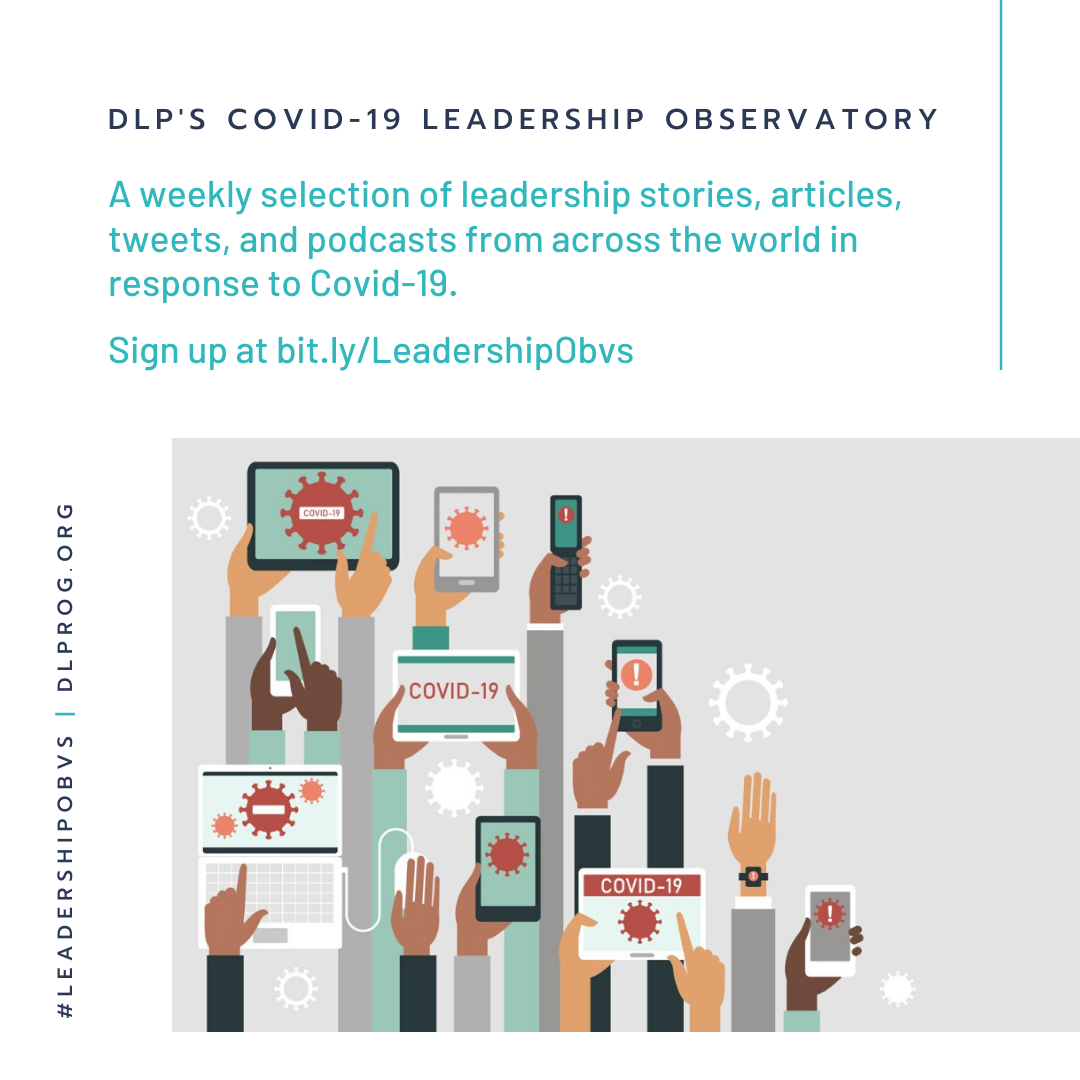Six months after the first case of COVID-19, we see the results of various approaches to virus control and prevention, with 25% of the global population experiencing a ‘lockdown’. This week’s #LeadershipObvs features blogs that highlight the strengths and limitations of different leadership approaches, and we see a greater focus on collective regional and local leadership strategies from Australia to the Caribbean.
Robin Niblett and Dr Leslie Vinjamuri, ‘Why Democracies Do Better at Surviving Pandemics’, Chatham House, 26 May 2020.
Coronavirus has revealed underlying vulnerabilities in autocracies. Democracies may be slow and chaotic, but they are resilient and adaptable. Authoritarian systems may be decisive, but they are brittle. Niblett and Vinjamuri argue that democracies build trust through the mobilisation of support from universities, foundations and non-profit organisations, who collaborate to deliver medical support or attempt to secure a vaccine against the amorphous cross-border virus. Spaces need to be created where these organisations and other actors can discover and amplify their collective leadership power.
#LeadershipObvs in a nutshell: Democracies have responded resiliently to this crisis because of the power and freedom of civil society.
Bronwyn Fredericks, Sarah Holcombe and Abraham Bradfield, ‘Reconciliation Week: a time to reflect on strong Indigenous leadership and resilience in the face of a pandemic’, The Conversation, 29 May 2020.
Indigenous Australians have demonstrated strong leadership during the coronavirus outbreak. Residents have set up roadblocks, evacuated people from regional towns, and put limits on fuel to prevent non-essential travel. These actions stress the importance of local-level decision-making in preventing outbreaks of COVID-19. Fredericks and Holcombe argue that the Australian federal government is more likely to shift its future approach when working with Indigenous NGOs – to ensure we don’t go back to what was “normal”.
#LeadershipObvs in a nutshell: Indigenous responses to coronavirus have demonstrated the effectiveness of local-level decision-making.
Myriam Blin and Jess Auerbach, ‘How Mauritius’ unique political culture helped it beat COVID-19’, African Arguments, 28 May 2020.
Alarming predictions of a coronavirus outbreak in Mauritius (90,000 moderate cases and 800 deaths) were prevented due to the political leadership. On 11 May the country was free of cases. Blin and Auerbach argue that the rapid response to testing, mobilisation of the highly connected society, and the paternalistic political leadership in government were the main contributors to success. The government also benefitted from a long-standing culture that calls on people to act in the interest of national unity. Governments should be encouraged to conduct regular political analysis to maximise their structural strengths.
#LeadershipObvs in a nutshell: Working with the grain of local culture can help garner public support for virus prevention efforts.
Emily Wilkinson, ‘COVID-19: a lesson in leadership from the Caribbean’, ODI, 18 May 2020.
The absence of global leadership during the COVID-19 outbreak has drawn attention to regional leadership: notably in the Caribbean, where efforts have been stepped-up to manage the sourcing of PPE. The president of Barbados, Mia Mottley, has been active on the world stage, calling for a new international economic order to address deepening inequality. Wilkinson argues that we need to give more space to female leaders and listen to their views to address increasing inequality within and between countries.
#LeadershipObvs in a nutshell: Regional leadership will be key to ‘building back better’ for small islands in the Caribbean.
Saltanat Janenova and Jonathan Fisher, ‘How Central Asia’s authoritarian regimes have used coronavirus to their advantage’, The Conversation, 21 May 2020.
Turkmen police have reportedly arrested citizens found to be discussing coronavirus in public, or wearing protective face masks. Janenova and Fisher argue that there has been a gradual loss of public trust in Central Asian governments’ competence, resulting from weak policy implementation capacity, rampant corruption, and limited citizen engagement. New and harsh legislative measures are likely to remain a permanent feature of the new normal. Policymakers should be aware of these risks as they support leaders through the crisis.
#LeadershipObvs in a nutshell: Coronavirus has left authoritarian regimes dangerously exposed to the risks of rising public discontent.
Nilima Gulrajani, ‘How COVID-19 can change incentives for development co-operation’, OECD Development Matters, 27 May 2020.
Gulrajani argues that ODA spending has been reframed significantly since the COVID-19 outbreak, as often happens after significant global events, in the interests of donors. Compassion and care unleashed by the pandemic are reason to remain hopeful, as aid remains one of the few functional instruments in the toolboxes of bilateral and multilateral donors. Global leadership should become more responsive against the backdrop of virus-induced de-globalisation.
#LeadershipObvs in a nutshell: The coronavirus pandemic may incentivise political leaders and activists to come together as permanent and more accountable surrogates for side-lined foreign experts.
Tran Chung Chau, Michael R. DiGregorio, and Nicola Nixon, ‘Vietnam: A COVID-19 Success Story’, The Asia Foundation, 27 May 2020.
Chau, DiGregorio, and Nixon show how Vietnam – a country of ‘notorious rule breakers’ – used contact tracing, free health care for COVID-19 patients, and public information sharing to reduce the spread of coronavirus. All parts of the Vietnamese government were engaged to respond effectively to the pandemic. Although state power in Vietnam appears highly centralised, the provinces have considerable autonomy. This blog highlights the importance of individual agency when implementing life-changing policies.
#LeadershipObvs in a nutshell: Vietnam’s new transparent authoritarianism is succeeding because it builds on decades of control that leaves enough room for agency.
Christopher Vandome, ‘COVID-19 in South Africa: Leadership, Resilience and Inequality’, Chatham House, 7 May 2020.
South Africa imposed a lockdown when the country had 1,000 COVID-19 cases and only two deaths. Vandome argues that accelerated reform and significant restructuring is required in South Africa following the announcement of a below investment grade credit rating on the eve of lockdown. The UN has criticised South Africa for the use of lethal force in enforcing lockdown. South Africa’s president Cyril Ramaphosa has used his influence over international partners to speak on behalf of the global south.
#LeadershipObvs in a nutshell: Economic reforms, managing COVID-19, and rebuilding trust in the South African government need to happen simultaneously.
Sign up to the DLP #LeadershipObvs
Sign up to receive the #LeadershipObvs directly to your inbox
A full list of leadership resources
Other resources are available on Twitter using #LeadershipObvs @DLProg











